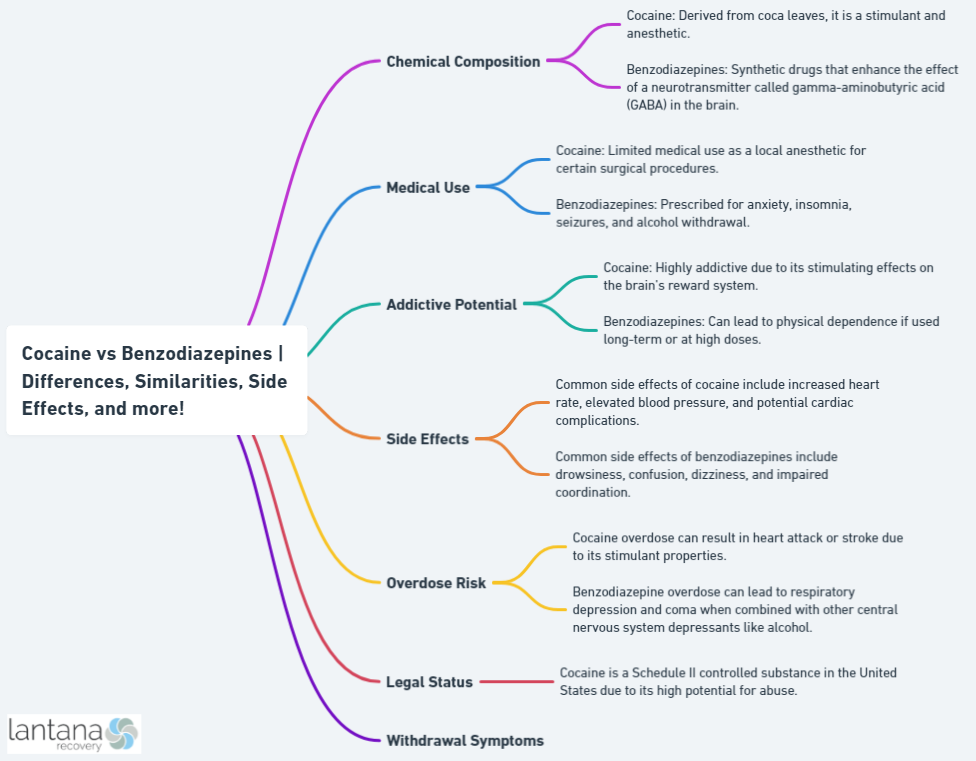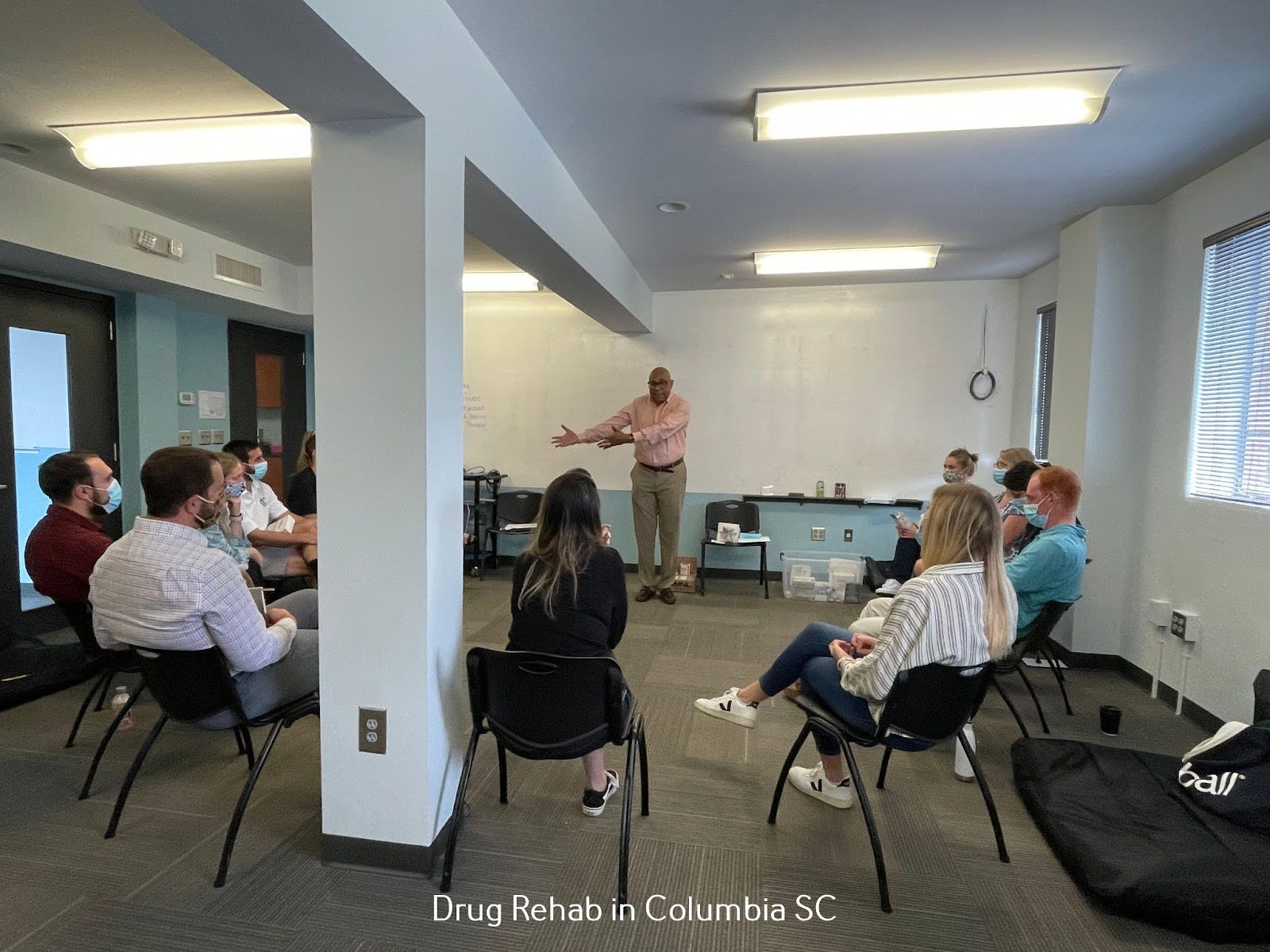Benzodiazepines and cocaine are two of the most common drugs used in the world today. While they differ in general makeup, usage, side effects, and cost, these drugs share many similarities that make them both so popular – yet dangerously addictive.
To understand all aspects of benzodiazepines vs cocaine, including their interactions with alcohol or other substances, this blog post delves into a comprehensive overview highlighting all differences and similarities between each drug to ensure you can use it safely while avoiding permanent health consequences.
Read on to learn more!
What is Cocaine?
Cocaine is a highly addictive stimulant drug made from the leaves of the coca plant native to South America. It is typically sold as a white powder and is commonly snorted, but can also be smoked or injected.
Cocaine has a number of harmful effects on the body, including increased heart rate and blood pressure, and can lead to serious health problems or overdose. Long-term use can also lead to addiction and mental health issues.
This high is often followed by feelings of agitation, irritability, paranoia, and depression, often leading to drug addiction.
Chemical Composition of Cocaine
Cocaine is a tropane alkaloid and its chemical name is benzoylmethylecgonine. Its chemical formula is C17H21NO4.
What are Benzodiazepines?
Benzodiazepines are a group of drugs that lead to sedative, hypnotic, anticonvulsant, and muscle relaxant effects on the body. They are commonly prescribed in order to reduce anxiety and treat neurological disorders such as epileptic seizures.
The general mechanism of action that benzodiazepines use is to improve the activity of certain chemicals (gamma-aminobutyric acid or GABA) in the brain which enables the body to enter into a relaxed state.
Common benzodiazepine drugs include Xanax (alprazolam), Valium (diazepam), Ativan (lorazepam), and Klonopin (clonazepam).

Chemical Composition of Benzodiazepines
The chemical composition of benzodiazepines varies depending on the specific drug. However, they all have a common chemical structure that includes a benzene ring, a diazepine ring, and a side chain. The specific side chain of a benzodiazepine determines its specific properties and effects.
Cocaine vs. Benzodiazepines: Fact Sheet
Despite having different chemical structures and different uses, both cocaine and benzodiazepines have similar effects on the body when abused recreationally. Both substances are highly addictive due to their “high” effects being extremely desirable.
|
Cocaine |
Benzodiazepines |
|
| Generic Name | Cocaine | Benzos |
| Drug Type | CNS stimulant, Anesthetic | Sedative |
| Active Ingredients | Benzoylmethylecgonine | Benzene ring and Diazepine ring |
| Used as a treatment for | Anesthetic and painkiller | Anxiety and Panic Disorders |
| Available Form(s) | Powder and liquid | Tablets, Capsules, and Injections |
| Available Strengths | Depends on the type of Benzodiazepine but somewhere between 0.25 mg to 50 mg | |
| Is it a controlled substance? | Yes, Schedule II drug | Yes, Schedule IV drugs |
| Legal Status | Illegal, can only be prescribed medically | Can only be prescribed medically |
| Risk of Withdrawal Effects | Yes | Yes |
| Risk of Addiction | Yes | Yes |
Benzodiazepines Dosage and Side Effects:
Benzodiazepines are a class of drugs that have been used to treat several conditions, including anxiety, insomnia, seizures, and alcohol withdrawal. These medications work by increasing the effect of a neurotransmitter called GABA in the brain.
They are typically prescribed for short-term use because long-term use can lead to dependency and tolerance. That is why, doctors often start by prescribing very small amounts i.e. (0.25 – 0.5 mg) and slowly increase as needed/tolerated.
The dosage prescribed by your doctor will depend on the severity of your condition, as well as your age, the type of Benzodiazepine, and any other medical problems you may have. It is important to stick to the instructions given by your healthcare provider when it comes to taking these medications.
In general, benzodiazepines should not be taken more than 4-6 weeks at a time as long-term use can lead to physical dependence and tolerance. If you experience side effects while taking benzodiazepines, talk to your doctor or pharmacist right away.
Common side effects include drowsiness, fatigue, confusion, dizziness, blurred vision and depression. In rare cases, they can also cause serious reactions such as impaired coordination or memory loss.
When getting off benzodiazepine use after prolonged treatment periods it is recommended that doses be tapered gradually rather than stopped abruptly in order to prevent withdrawal symptoms such as seizures or delirium tremens.
Crack Dosage and Side Effects:

Cocaine is a powerful drug that is derived from poppy seeds and can create an intense experience for users. While there is no recommended dosage for cocaine as it is an illicit substance without any medical usage, most people use between 10 to 15 milligrams at a time.
The side effects of using cocaine can be unpredictable and vary from person to person, but typically include confusion and fatigue, as well as general irritability. Over time, these side effects can worsen and become much more dangerous.
High dosage levels are particularly concerning as they can ultimately lead to seizures, cardiac arrest, or even death. This is why medical professionals strongly advise those struggling with a cocaine addiction to seek professional help – not just for their safety but for many chances at a healthier lifestyle in general.
Benzodiazepines vs. Crack: Can You Withdrawal for Either?
Yes, you can withdraw for both benzodiazepines and cocaine as both of the drugs are known to be habit-forming. Generally speaking, withdrawing from benzodiazepines is much easier than withdrawing from cocaine due to the long-term usage required when taking these drugs for therapeutic purposes.
Benzo withdrawal involves gradually tapering off use over time while under medical supervision; whereas cocaine typically requires detoxification and rehabilitation programs to address both psychological dependence and physiological cravings.
Also, benzos are considered relatively safe when taken at prescribed doses, using too much or combining them with alcohol or other drugs like Adderall can have serious side effects like respiratory depression or coma.
In contrast, any amount of cocaine use carries the potential risk of developing an addiction that could lead to more serious health problems down the road such as cardiovascular disease or stroke if left untreated.
Overall, benzos may provide temporary relief for anxiety or insomnia but have been known to cause addiction with long-term usage if not taken according to doctor’s orders. Whereas cocaine has no medicinal or therapeutic value whatsoever and its use leads almost immediately down a path toward addiction that could ultimately destroy one’s life. If it is not addressed appropriately with professional help from a qualified rehab facility.
Cocaine vs Benzodiazepines: Prevalence in the United States

The use of benzodiazepines is widespread in the United States. The number of benzodiazepines prescriptions has doubled since 2005 in the United States. However, mostly described to treat neurological disorders, almost half of the patients reported using them longer than the recommended period.
As per the data from World Health Organization, in 2020 almost 4% of American adults between 15-64 used benzodiazepines for non-medical purposes.
In comparison to benzodiazepines, cocaine usage is far less widespread in the United States but still poses an immense health risk. It is highly potent and produces an intense euphoric high followed by devastating lows which can lead to substance abuse disorders and dependence.
According to the Substance Abuse and Mental Health Services Administration’s 2020 National Survey on Drug Use and Health report, approximately 1.9 million Americans said they had used cocaine in the month leading up to the survey. Moreover, as per CDC the deaths caused by cocaine overdose disproportionately affect marginalized communities like African-Americans and Native Americans due to the lack of awareness and lack of access to treatment programs.
Bottom Line: Cocaine versus Benzodiazepines

Both drugs serve different purposes and have different effects on the brain. Benzodiazepines are more commonly prescribed for anxiety disorders, while cocaine is commonly abused recreationally.
Despite their differences, both drugs can be addictive and cause serious side effects. If you think you or someone you know may be struggling with substance abuse related to either drug then it is important that you seek help immediately from a qualified professional who can provide both medical advice and psychological support during your recovery process.
FAQs on Benzodiazepines and Cocaine
Which is more addicting: Cocaine or Benzodiazepines?
Cocaine has a higher tendency to misuse and abuse than Benzodiazepines.
How can I safely use Benzodiazepines?
The safest way to use Benzodiazepine is to get them prescribed by a doctor and only use the recommended dosage. And when you decide to quit, again refer to a doctor for help with the tapering schedule.
Can cocaine overdose cause death?
Yes in some cases, a cocaine overdose can be fatal if untreated. Although many other factors primarily the pre-existing medical conditions can also contribute to a cocaine overdose.






